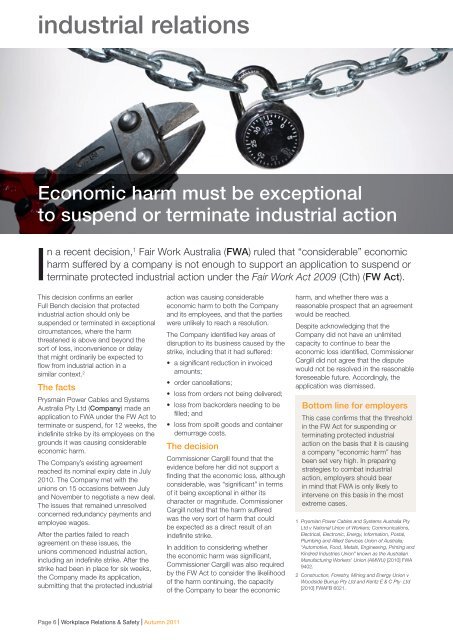Autumn Bulletin
Autumn Bulletin
Autumn Bulletin
Create successful ePaper yourself
Turn your PDF publications into a flip-book with our unique Google optimized e-Paper software.
industrial relations<br />
economic harm must be exceptional<br />
to suspend or terminate industrial action<br />
In a recent decision, 1 Fair Work Australia (FWA) ruled that “considerable” economic<br />
harm suffered by a company is not enough to support an application to suspend or<br />
terminate protected industrial action under the Fair Work Act 2009 (Cth) (FW Act).<br />
This decision confirms an earlier<br />
Full Bench decision that protected<br />
industrial action should only be<br />
suspended or terminated in exceptional<br />
circumstances, where the harm<br />
threatened is above and beyond the<br />
sort of loss, inconvenience or delay<br />
that might ordinarily be expected to<br />
flow from industrial action in a<br />
similar context. 2<br />
the facts<br />
Prysmain Power Cables and Systems<br />
Australia Pty Ltd (company) made an<br />
application to FWA under the FW Act to<br />
terminate or suspend, for 12 weeks, the<br />
indefinite strike by its employees on the<br />
grounds it was causing considerable<br />
economic harm.<br />
The Company’s existing agreement<br />
reached its nominal expiry date in July<br />
2010. The Company met with the<br />
unions on 15 occasions between July<br />
and November to negotiate a new deal.<br />
The issues that remained unresolved<br />
concerned redundancy payments and<br />
employee wages.<br />
After the parties failed to reach<br />
agreement on these issues, the<br />
unions commenced industrial action,<br />
including an indefinite strike. After the<br />
strike had been in place for six weeks,<br />
the Company made its application,<br />
submitting that the protected industrial<br />
Page 6 l Workplace Relations & Safety l <strong>Autumn</strong> 2011<br />
action was causing considerable<br />
economic harm to both the Company<br />
and its employees, and that the parties<br />
were unlikely to reach a resolution.<br />
The Company identified key areas of<br />
disruption to its business caused by the<br />
strike, including that it had suffered:<br />
• a significant reduction in invoiced<br />
amounts;<br />
• order cancellations;<br />
• loss from orders not being delivered;<br />
• loss from backorders needing to be<br />
filled; and<br />
• loss from spoilt goods and container<br />
demurrage costs.<br />
the decision<br />
Commissioner Cargill found that the<br />
evidence before her did not support a<br />
finding that the economic loss, although<br />
considerable, was “significant” in terms<br />
of it being exceptional in either its<br />
character or magnitude. Commissioner<br />
Cargill noted that the harm suffered<br />
was the very sort of harm that could<br />
be expected as a direct result of an<br />
indefinite strike.<br />
In addition to considering whether<br />
the economic harm was significant,<br />
Commissioner Cargill was also required<br />
by the FW Act to consider the likelihood<br />
of the harm continuing, the capacity<br />
of the Company to bear the economic<br />
harm, and whether there was a<br />
reasonable prospect that an agreement<br />
would be reached.<br />
Despite acknowledging that the<br />
Company did not have an unlimited<br />
capacity to continue to bear the<br />
economic loss identified, Commissioner<br />
Cargill did not agree that the dispute<br />
would not be resolved in the reasonable<br />
foreseeable future. Accordingly, the<br />
application was dismissed.<br />
Bottom line for employers<br />
This case confirms that the threshold<br />
in the FW Act for suspending or<br />
terminating protected industrial<br />
action on the basis that it is causing<br />
a company “economic harm” has<br />
been set very high. In preparing<br />
strategies to combat industrial<br />
action, employers should bear<br />
in mind that FWA is only likely to<br />
intervene on this basis in the most<br />
extreme cases.<br />
1 Prysmian Power Cables and Systems Australia Pty<br />
Ltd v National Union of Workers; Communications,<br />
Electrical, Electronic, Energy, Information, Postal,<br />
Plumbing and Allied Services Union of Australia;<br />
“Automotive, Food, Metals, Engineering, Printing and<br />
Kindred Industries Union” known as the Australian<br />
Manufacturing Workers’ Union (AMWU) [2010] FWA<br />
9402.<br />
2 Construction, Forestry, Mining and Energy Union v<br />
Woodside Burrup Pty Ltd and Kentz E & C Pty Ltd<br />
[2010] FWAFB 6021.


